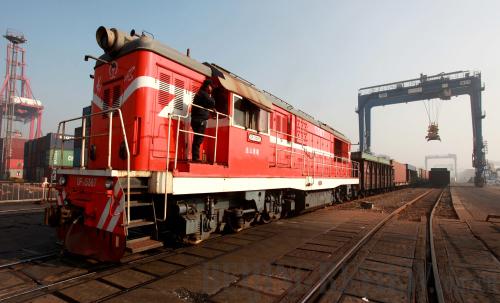|
 |
|
BOOMING TRADE: A train full of containers leaves Lianyungang Port, the eastern bridgehead of the new Euro-Asia continental bridge. About 90 percent of inland cross-border containers are transferred via the 10,870-km-long continental bridge, starting from Lianyungang, China, to Rotterdam, the Netherlands (WANG JIANMIN) |
Numbers of the Week
55.2%
The purchasing managers index (PMI) of China's manufacturing sector rose to 55.2 percent in November, up 0.5 percentage points from October, said the China Federation of Logistics and Purchasing.
18,848
Volvo and Chang'an Ford Mazda Automobile Co. will recall 18,848 vehicles in China, including the Volvo XC60, C30 2.0, S40 and S80L models, beginning November 29 to repair airbag, software, and cooling system defects.
TO THE POINT: Foreign companies doing business in China are now seeing an end of an era, as favorable tax policies are dropped and they will compete against domestic companies on an equal footing. Chinese property developers loaded with money are making a drop in housing prices less likely in the short term. Analysts expect the sizzling auto market in China to cool in 2011 due to a matured market and the exit of stimulus measures. A batch of genetically modified corn imported from the United States was sent back to its origin after forbidden ingredients were found. China is speeding up its mapping business by setting up a geographic information industrial park in Beijing.
By LIU YUNYUN
Tax Equality
China is bridging the tax burdens between domestic and foreign companies in the country, ending the decades-long favorable treatment for foreign enterprises.
China will charge foreign firms operating here with two additional taxes—a construction tax and an education surcharge—effective December 1, according to the State Council. The two measures marked the beginning of a standard national tax treatment for foreign and Chinese enterprises.
At the beginning of reform and opening up in the late 1970s, China launched super-preferential tax policies for international companies in a bid to propel its economic growth. The multinationals were exempt from some taxes. Over the past few years, the preferential policies have gradually been phased out.
The recent adjustment means a 10 percent rise of costs for foreign operations in China.
"I don't think this will exert any negative effect on the growth of foreign direct investment in China, given China's robust economic growth and increasing domestic consumption, which will steadily help the market maintain its appeal to foreign businesses," said Wang Zhile, Director of the Research Center on Multinationals under the Ministry of Commerce (MOFCOM).
Fat Cat Developers
In spite of the government's repeated efforts to curb surging urban property prices, deep-pocketed property developers have no intention of slashing housing prices.
A total of 5.69 trillion yuan ($854 billion) has found its way to Chinese property developers over the first 10 months of this year, up 32 percent year on year, according to data from the National Bureau of Statistics (NBS). Among the 5.69 trillion yuan, 1.04 trillion yuan was from bank loans, up 26.3 percent year on year.
Real estate developers in China may have a capital source of 7 trillion yuan ($1.05 trillion) this year, more than last year's 5.71 trillion yuan ($857.5 billion), said the China Securities Journal citing analyst Tu Lilei with Haitong Securities Co. Ltd.
This year, China suspended mortgage loans for third-home purchases and pledged to speed up trials of property taxes to restrain foreign capital and cool real estate prices. The central bank raised interest rates in October and increased the reserve-ratio requirements for banks twice in November. This was meant to cool the sizzling housing market.
However, the market defied the government's efforts. According to SouFun Holdings Ltd., the nation's biggest real estate website owner, housing prices in 100 cities averaged 8,487 yuan ($1,267) per square meter in November, rising 0.82 percent over October, gaining for a second month even as the central bank raised interest rates for the first time since 2007.
Fewer Auto Sales
After years of booming sales, China's auto market might experience a slowdown in growth in 2011.
Auto sales growth in the Chinese market will reach 30 percent in 2010, but might slow to 10 percent in 2011, according to a report from the U.S.-based J.D. Power and Associates.
Chinese officials have recognized the troubles brought on by the rapid increase of automobiles on the street, including traffic congestion, pollution and unrestrained expansion of production capacities, according to Zhu Ming, an analyst at the U.S. research company.
The current stimulus policies of auto purchasing might be stopped in 2011, restricting people's willingness to buy.
In 2010, domestic automakers used about 88 percent of their manufacturing capability, while some joint ventures with foreign companies were running 24-hours a day, and seven days a week to meet demands.
Analysts warned that automakers will be challenged with managing a surplus in production next year if sales stagnate.
GM Corn Denied
Genetically modified (GM) products, whose safety is a great concern of Chinese citizens, met a new challenge in the Chinese market.
Almost 54,000 tons of GM corn imported from the United States was returned after a forbidden GM ingredient, MON89034, was spotted by the Shenzhen Entry-Exit Inspection and Quarantine Bureau in south China's Guangdong Province. The decision was made in accordance with the Regulations on Safety Administration of Agricultural Genetically Modified Organism.
| 